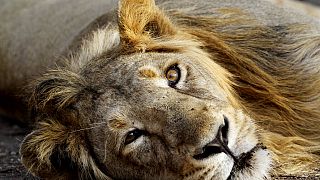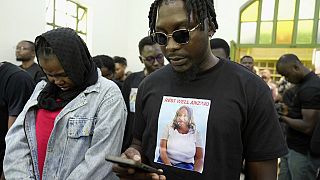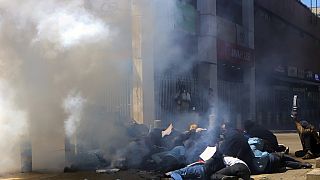Kenya
In Kenya's national parks, the lion population is in constant decline.
It's been attributed to a range of factors, but particularly climate change and human-wildlife conflict. As human populations increase, settlements in ancient lion rangelands are displacing animals long preyed on by the big cats.
"If the prey species are not there, the lions go for the alternative which is mostly livestock and that causes human-lion conflict," says Shadrack Ngene, head of species conservation management at Kenya Wildlife Service.
But now, Kenya's lions are having to contend with a newer problem - climate change.
Ngene says drought is threatening lions and their prey, leaving them less drinking water and less food.
"The lack of water or the drought may result in mass death of prey species which means the lions will have no food and then they will die," he says.
"On the other hand, if we have excessive rainfall, we will have emigration of prey species, and this will make the lions lack food and in the process they may die," says Ngene.
Patricia Heather-Hayes, a conservation enthusiast and lion researcher at Friends of Nairobi National Park, has seen the effects first-hand.
She says in 2018, Nairobi National Park lost 14 young cubs, their deaths might be linked to serious flooding that year.
"The park was quite heavily affected, and we lost 14 cubs and they were all very young, and they slowly but surely all died and disappeared," she says.
"And I think pneumonia is probably the main cause of it, others are hyenas, and they get killed naturally, but I think for us to have lost so many in one year it had to be the climate to do with a lot of it."
Heather-Hayes says human-wildlife conflict is also an issue. She suggests fencing part of the park where conflict has arisen.
This follows news of a young male lion that was found trapped inside a residential building. Eyewitnesses said it seemed to have lost direction while walking back into the park.
"The area that has the most human-wildlife conflict is a heavily populated, densely built upon which was used to be open. The only solution I can see for that, for the lions and the buffalo is to fence that one area," says Heather-Hayes.
Tuesday 10 August marks World Lion Day. According to the IUCN's Red List of threatened species, the African Lion - or Panthera leo - is classified as "Vulnerable".











Go to video
84% of world's coral reefs affected by worst coral bleaching event in history
02:16
Earth Day: Fighting microfibre pollution one laundry at a time
02:19
In Ghana, an illegal settlement turned a forest reserve into a criminal city
01:50
Solar-Powered Cookers offer sustainable solution in Kenya
04:52
Acid spill devastates Zambia’s Kafue River
01:54
South Africa Reports 16% Drop in Rhino Poaching, but Concerns Remain